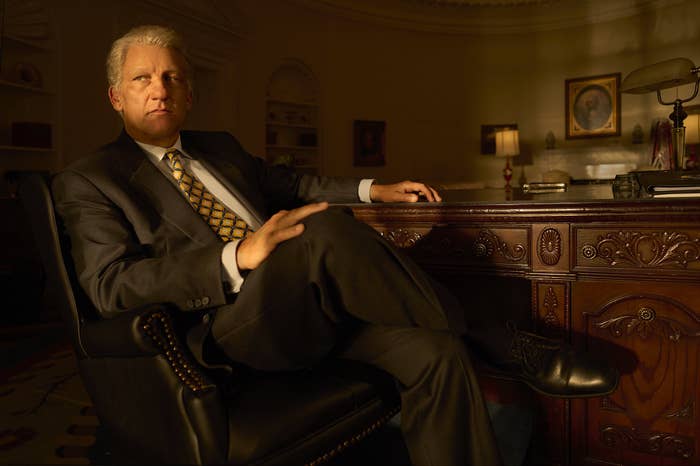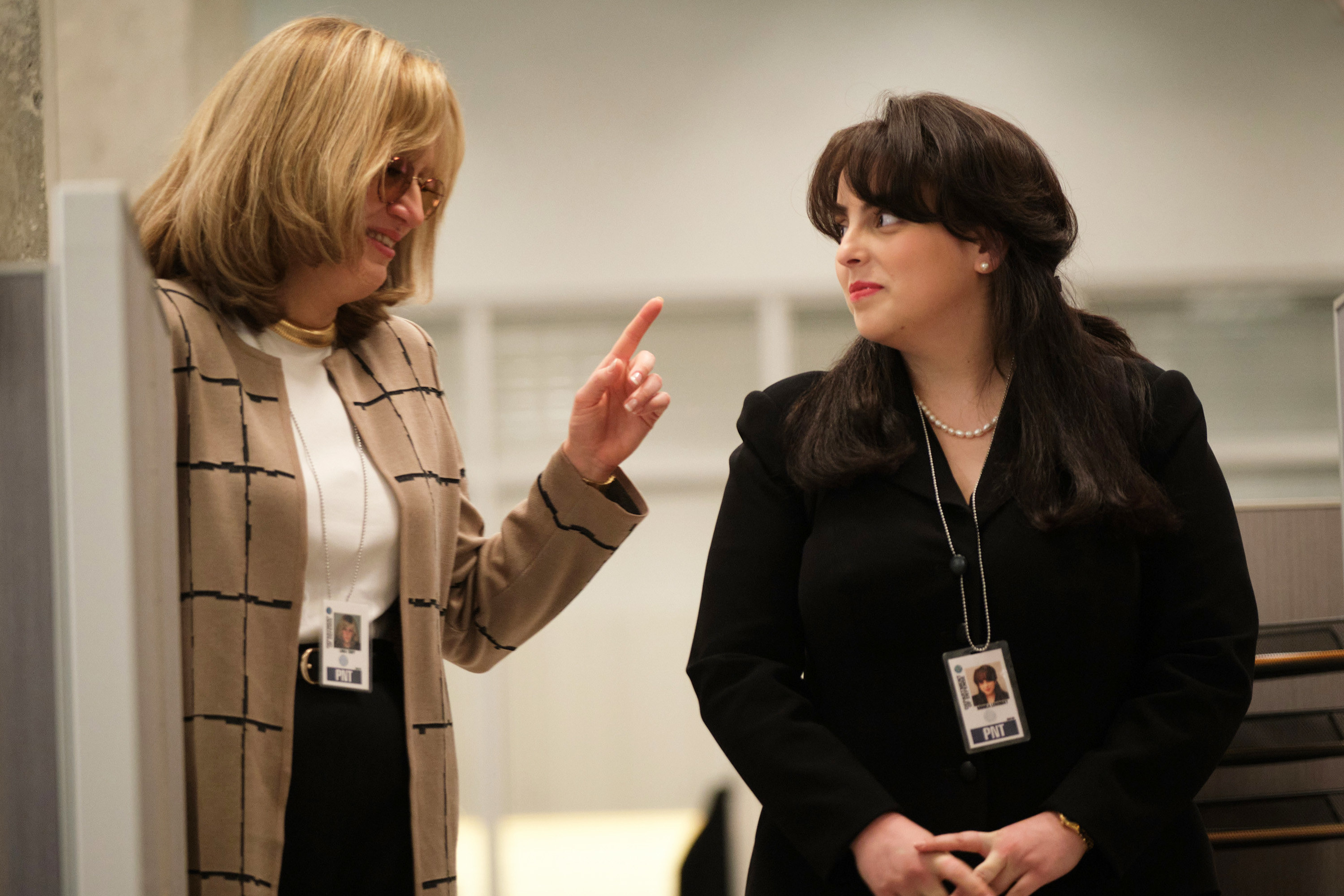
The streaming era has seen an explosion of content devoted to revisiting, and collectively reliving, sensational scandals that became national news events, from the O.J. Simpson trial to the Menendez brothers' case.
The best of these productions, such as HBO’s recent Allen v. Farrow, raise questions about the biases of the justice system and the media regarding the workings of power and gender. They also provide more nuanced portraits of the protagonists, especially women who became tabloid caricatures — routinely slut-shamed or framed as scorned lovers or femmes fatales.
The Clinton era would seem perfect for this kind of reconsideration as well. When Bill Clinton was impeached for perjury in 1998 after lying under oath about his affair with his intern Monica Lewinsky, it became a sensational soap opera that everyone remembers, at least in outline. Images and soundbites were etched into cultural memory, from prosecutor Ken Starr’s bespectacled zealotry to Clinton’s smarmy-angry denunciation of “that woman” to headlines about “the dress” that defined Lewinsky, along with the misogynist jokes and coverage of her life.
Throughout it all, Lewinsky wasn’t allowed to speak due to her immunity agreement with prosecutors. But when her gag order was finally lifted, she started reclaiming her image and narrative, first with a 1999 Barbara Walters sit-down and a memoir, Monica’s Story, then with an HBO special in 2002. In the aughts, she framed herself as a survivor of public shaming in a popular TED Talk, and, following the advent of #MeToo, she wrote op-eds and spoke out on Twitter about the lopsided way the scandal had been covered and remembered — down to the fact that the events were often referred to as the Lewinsky scandal rather than centering the president’s misconduct.
FX’s new limited series Impeachment: American Crime Story focuses largely on reframing Lewinsky’s story and revisits the impeachment mostly from her perspective. (Lewinsky is a producer on the show.) It also includes the stories of Linda Tripp, the fellow Pentagon employee and Lewinsky confidant who recorded their conversations, and Paula Jones, another of the president’s accusers. It tries to reframe the case as a story not about sex, cigars, and betrayal but about changing media mores and abuse of power.
But in the seven episodes made available to critics, Impeachment doesn’t really provide any more insight than existing documentaries, like A&E’s 2018 The Clinton Affair — which also included Lewinsky’s participation — have already done. The series tries to build on existing critiques of how the events played out, but its analysis mostly falls flat. Like other recent scripted attempts at capturing significant political moments through detailed portraits of women, such as Mrs. America and Bombshell, it feeds into ready-made narratives about partisanship and misses the opportunity to add nuance to pop cultural understandings of gender and power.

Ryan Murphy’s relitigation of national scandals often tends toward simplistic narratives. The People v. O.J. Simpson: American Crime Story might as well have been titled The Maligning of Marcia Clark; it’s somehow remembered as an incisive analysis of racial bias in the justice system, but the series mostly worked as a sympathetic portrait of Clark. The follow-up installment of American Crime Story, about Gianni Versace’s killer, Andrew Cunanan, didn’t quite come together as a cohesive show and struggled in the ratings, precisely because there wasn’t a ready-made narrative of women’s vulnerability and empowerment to apply to the story.
Impeachment follows a similar pattern as The People v. O.J. Simpson and mostly focuses on Lewinsky’s story and perspective. It begins with the moment when Lewinsky (Beanie Feldstein) gets cornered in a mall by intimidating FBI agents and Tripp (Sarah Paulson), who has taped her admitting to an affair with the president even though the former intern has declared under oath that it didn't happen.
Impeachment’s Clinton (Clive Owen) is the ultimate faux nice guy, making all his proclamations about hiring women even as loneliness and ego drive him to seek out Lewinsky. As the series moves back and forth in time, it recontextualizes their affair as part of the president’s pattern of inappropriate behavior, including the stories of other women like Kathleen Willey, whom Clinton allegedly groped in his office, and Paula Jones (Annaleigh Ashford), the show’s other big protagonist. Jones is thrust into the spotlight after her name is revealed in a magazine story about Clinton’s time as governor, and conservative activist Susan Carpenter McMillan (Judith Light) takes her up, seemingly as an emblem of conservative feminism. But beyond that, Jones’ story is not really fleshed out.
Instead, the series is most absorbing when it is humanizing Lewinsky and Tripp, especially as it unpacks the relationship between the two — Tripp, a single divorcée, and Lewinsky, a privileged young woman coming to terms with a lying “Big Creep” in her life who just happens to be the president.
The performances work, even if the writing is mostly one-note. For instance, we mostly see Lewinsky moping about the president; Feldstein captures her vulnerability, but we don’t get to see much of Lewinsky’s exuberant charisma. Tripp has largely been framed, in Saturday Night Live skits and endless jokes, as a creepy betrayer of Lewinsky. Here, she’s shown as something of a sad bureaucrat who is acting out of self-protection but also self-interest, hoping for a book deal. One of the specificities the show does capture is Tripp’s sense that Lewinsky, a rich woman from Beverly Hills, would be taken care of in a way that she wouldn’t, and her decision to record their conversation is partly depicted as a way of protecting herself in case the story gets out.
The show’s most glaring issue — something it shares with Bombshell and Mrs. America — is its inability to represent whiteness and class privilege as driving political motivations. From the start, it links the interpersonal drama with the political machinations and interests that would ultimately drive the impeachment. Behind the legal maneuvering are right-wing attorneys, including George Conway and Ann Coulter, nicknamed “the elves,” who seize on Clinton’s indiscretions as an opportunity to bring him down. The show points out how they were instrumental in getting Clinton to testify under oath in the Jones lawsuit.
“The elves” are depicted as anti-Clintonites disgusted by his unethical behavior. Yet there is no mention of the fact that they were trained by and remained in the orbit of the Federalist Society. The group has been laundering racist ideas as federalism for decades, and corporate media has helped normalize its ideas, in part through Coulter’s lavish platforming. (In the show, she’s depicted as a witty conservative contrarian.)
As for its presentation of media and power, Impeachment does the bare minimum. In one minor scene, Michael Isikoff, the Newsweek reporter who broke the Lewinsky story, takes issue when he’s described as being on the “sex beat”; he dutifully retorts that sex is about abuse of power. That’s true, but it’s hardly groundbreaking analysis with 20 years of hindsight. Similarly, the inclusion of Matt Drudge (played in an amazing Murphian stroke of casting by Billy Eichner) breaking the story before conventional media barely hints at how mainstream media struggled to catch up with emerging blogs. There’s no sense of the very real stakes of this shift for our present.
In an interview with the Today Show when the scandal first broke, Hillary Clinton famously spoke of a “vast right-wing conspiracy” to take down her husband while implying that the president hadn’t had sex with Lewinsky and that Starr’s team was making it up. But she was right for the wrong reasons; her husband might have lied, but there seemingly was a network of rich, white power brokers looking to maintain minority rule through deftly planned and well-executed anti-democratic means.

Clearly informed by Lewinsky’s memoir and perspective, Impeachment shows how devastating it was for her to be depicted as a stalker by the media and thrown under the bus, not just by the president but also by every man who came out of the woodwork to sell random anecdotes about her to cable news.
Since the scandal first hit, the narrative around Lewinsky has changed, and in many ways Lewinsky herself has done that work. She’s almost too perfect a Murphy subject. A smarter, more confident show would have provided a different context for looking at the legacies of that era.
It’s been sobering, for instance, to see that even as the media claims to have developed a greater awareness of the workings of gender and power, this has not led to greater understanding of how power is wielded in terms of class and race.
Lewinsky endured a lot, and she has helped shift the conversation about sex, gender, and power while reclaiming her narrative. But aside from her story, Impeachment feels like it’s looking back without any new perspective, and it’s rife with too-obvious takeaways. As a drama about a young woman thrust into the political spotlight, the series isn’t half bad. But as cultural commentary, it’s a symptom of the current moment, not a critique of it. ●
